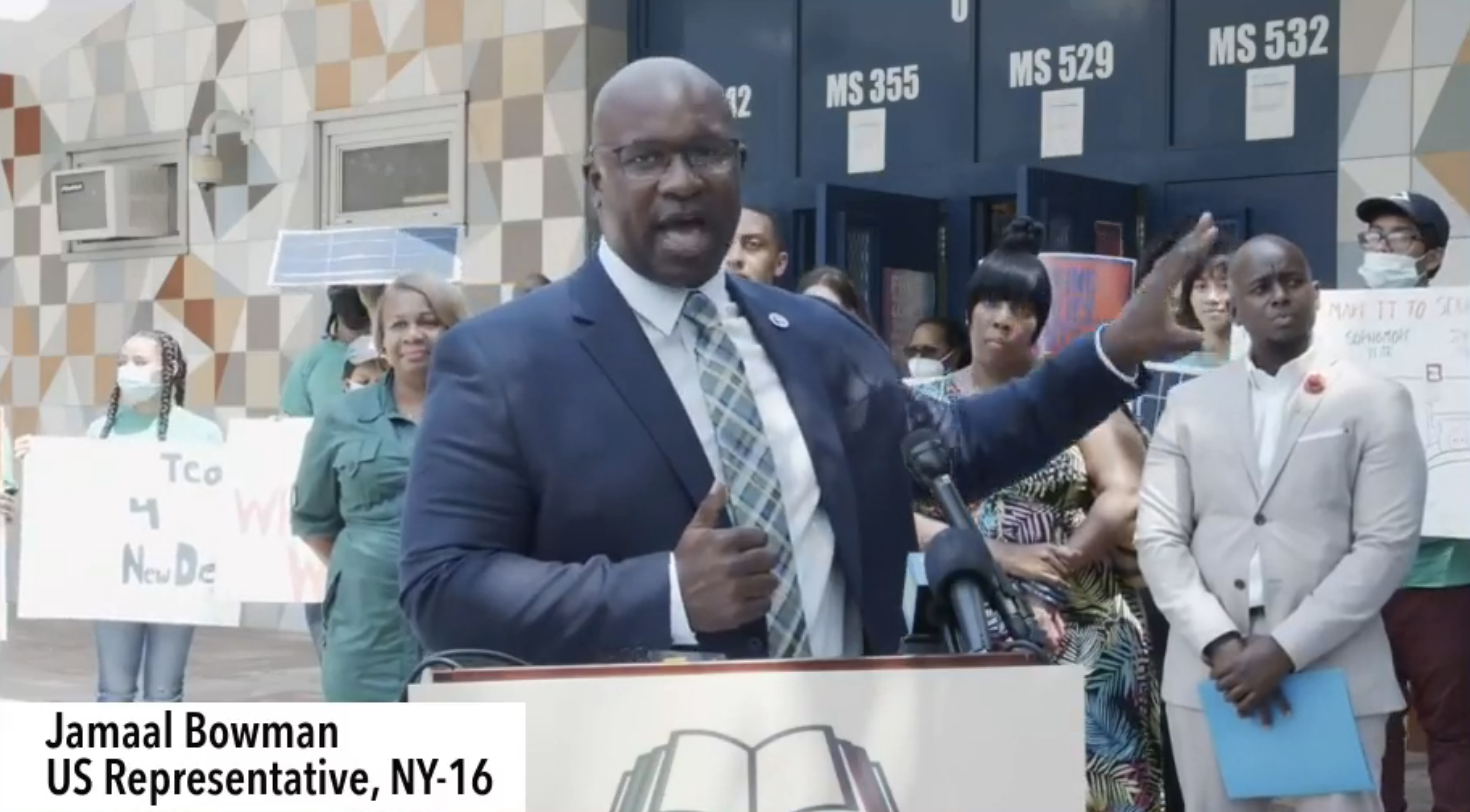We invite you to attend a press
conference
on Wednesday, September 22 at 1pm ET at the U.S. House Triangle (House
side of the Capitol’s East Front) to highlight the importance of holding
major fossil fuel companies accountable for their massive past global
pollution through the Polluters Pay Climate Fund.
Speakers include:
- Sen. Chris Van Hollen (D-Md.)
- Sen. Bernie Sanders (I-Vt.)
- Sen. Elizabeth Warren (D-Mass.)
- Rep. Jamaal Bowman (D-N.Y.)
- Rep. Alexandria Ocasio-Cortez (D-N.Y.)
U.S. House Triangle Capitol
09/22/2021 at 01:00PM
Posted by Brad Johnson on 07/15/2021 at 02:03PM
 Appearing
before the JP Sousa Junior High School in the Bronx, Rep. Jamaal Bowman
(D-N.Y.), a lifelong educator and former middle school principal, on
Thursday introduced the Green New Deal for Public Schools
Act.
Appearing
before the JP Sousa Junior High School in the Bronx, Rep. Jamaal Bowman
(D-N.Y.), a lifelong educator and former middle school principal, on
Thursday introduced the Green New Deal for Public Schools
Act.
The ambitious new legislation — which aims to invest $1.43 trillion over
10 years in public schools and infrastructure to combat climate change —
would invest in public school infrastructure by upgrading every public
school building in the country, addressing historical harms and
inequities by focusing support on high-need schools, and hiring and
training hundreds of thousands of additional educators and support
staff. If enacted, sponsors say, the legislation would fund 1.3 million
jobs per year and eliminate 78 million metric tons of
CO2 annually, the equivalent of taking 17
million cars off the road.
“It’s time for a revolution in public education,” said Rep. Jamaal
Bowman. “As we deal with a devastating climate crisis caused by decades
of unchecked corporate greed, we need to center our children and their
future. The Green New Deal for Public Schools represents the level of
school infrastructure investment that is urgent and necessary to heal
the harm from decades of disinvestment, redlining and cycles of poverty
and trauma, particularly for Black and brown children. What this comes
down to is whether we’re willing to provide our kids with the resources
they need to realize their brilliance and have a livable planet. Do we
want to continue building a world based on militarization,
incarceration, poverty, and destruction of resources? Or will we take
advantage of this moment, put our kids and educators first, and treat
the climate crisis as the emergency it is? This legislation is what we
need to put us on the right side of history.”
The legislation is modeled on a proposal by the Climate + Community
Project
at the University of Pennsylvania.
The Green New Deal for Public Schools proposes $1.43 trillion in new
funding
over 10 years, including the following distribution of resources:
- $446 billion in Climate Capital Facilities Grants and $40 billion
for a Climate Change Resiliency Program Climate Capital Facilities
Grants will fully fund healthy green retrofits for the highest-need
third of schools, as measured by the CDC
Social Vulnerability Index, and offer a mix of grant funding and no-
or low-interest loans for the middle and top thirds. Grants will cover
two-thirds and one-third of retrofit costs for these schools,
respectively.
- $250 billion in Resource Block Grants Resource Block Grants will
fund staffing increases, expanded social service programming, and
curriculum development at high-need schools. The program will allow
Local Educational Agencies across the country to hire and train
hundreds of thousands of additional educators and support staff,
including paraprofessionals, school psychologists and counselors, and
learning specialists. The funds may also be used to design
locally-rooted curricula; adopt trauma-informed, culturally
responsive, and restorative justice practices, to move towards a
“whole child” approach to public education; and partner with community
organizations to offer a range of services to schools and surrounding
neighborhoods, such as after-school programs.
- $100 million for an Educational Equity Planning Grants Pilot
Program Educational Equity Planning Grants will encourage
neighboring Local Education Agencies to form regional consortia, which
will receive funding to conduct extensive community outreach, identify
the historical and current sources of educational disparities within
the region, and create and implement a Regional Education Equity Plan
to address those disparities. This pilot program is modeled on the
U.S. Department of Housing and Urban Development’s Sustainable
Communities Regional Planning Grants, which are designed to encourage
equitable, locally-driven economic development.
- $695 billion over 10 years for Title I and IDEA (Individuals with
Disabilities Education Act) increases This bill proposes quadrupling
Title I funding to reach $66 billion annually to support schools and
districts with students living in poverty, as well as increasing
funding for IDEA Part B to reach $33 billion
annually to support students with disabilities.
 Appearing
before the JP Sousa Junior High School in the Bronx, Rep. Jamaal Bowman
(D-N.Y.), a lifelong educator and former middle school principal, on
Thursday introduced the
Appearing
before the JP Sousa Junior High School in the Bronx, Rep. Jamaal Bowman
(D-N.Y.), a lifelong educator and former middle school principal, on
Thursday introduced the